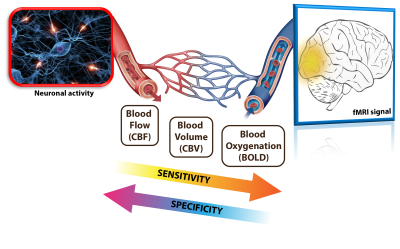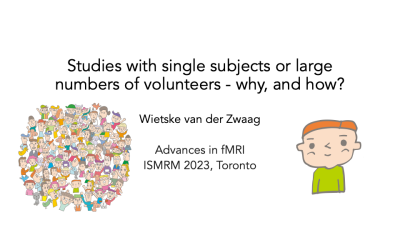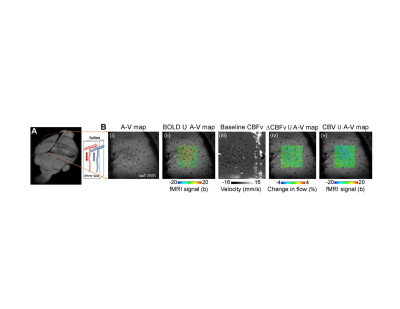Weekend Course
Advances in fMRI
ISMRM & ISMRT Annual Meeting & Exhibition • 03-08 June 2023 • Toronto, ON, Canada

| Advances in Probing Functional Activity | |||
| 13:00 |
 |
BOLD & Non-BOLD Contrasts in Human fMRI
Sriranga Kashyap
Keywords: Contrast mechanisms: fMRI, Neuro: Brain FMRI is a non-invasive method that allows scientists to study the brain function during task or at rest. The BOLD contrast is the workhorse of functional neuroimaging. A cascade of physiological events following neuronal activity (changes in blood oxygenation, flow and volume) culminates in the BOLD signal. The versatility of MRI enables imaging of blood flow and volume using techniques such as Arterial Spin Labelling (ASL) and Vascular Space Occupancy (VASO) respectively. In this talk, we will learn about BOLD and non-BOLD contrasts (CBF, CBV), discuss what they offer and how they differ in their application to human fMRI. |
|
| 13:30 |
 |
Studies with Single Subjects or Large Numbers of Volunteers -
Why, & How?
Wietske van der Zwaag
Keywords: Neuro: Brain function, Neuro: Brain, Neuro: Brain connectivity In the functional MRI field, datasets continue to grow. Interestingly, there are two different trends: There are currently multiple efforts towards collection of datasets with a huge number of participants, to capture the variance in a population, or to use the power of massive averaging to discover subtle brain function patterns. A second trend is towards exhaustive sampling of a single participant (or a few), arguing that measurements of one brain likely generalize to most other brains. Dense sampling allows experiments with either many conditions or extremely detailed images, exploring different types of variance. This talk will discuss both trends. |
|
| 14:00 |
Resting State fMRI & Recent Advances
Marta Bianciardi
Keywords: Neuro: Brain connectivity In this course, we first describe the major networks defined in humans based on resting state fMRI. We then present methods used for static and dynamic resting state fMRI connectivity analysis. Further, we provide an overview of resting state fMRI applications in neuroscience and in clinical studies, including recent advances in the field. Finally, we discuss current limitations of resting state fMRI methods and future directions. The target audience includes MRI scientists, neuroscientists, clinical researchers, neurologists and neurosurgeons interested in learning about methods, applications and recent advances of resting state fMRI in humans. |
||
| 14:30 |
 |
Advances in Preclinical fMRI
Xin Yu
Keywords: : Preclinical/Animal, Image acquisition: Fast imaging, Contrast mechanisms: Non-proton In this course, I will discuss the ultra-high resolution preclinical fMRI methods: line-scanning fMRI and single-vessel fMRI. In particular, the k-space reshuffled FLASH fMRI method will be highlighted to specify its unique features for high spatial resolution (vessel-specific) mapping and high temporal resolution (~5-10ms TR) mapping. Also, awake mouse fMRI with 100umx100umx200um resolution using 14T MRI scanner will be presented, which can be further applied to specify brain-wide vasodynamic changes. In the end, I will introduce the feasibility testing of 23Na-fMRI in rodent brains. |
|
| 15:00 |
Break & Meet the Teachers |
||
| Advances in Acquisition & Hardware Techniques | |||
| 15:30 |
Advances in fMRI Data Acquisition Techniques
Benedikt Poser
Keywords: Contrast mechanisms: fMRI I will first focus on echo-planar imaging readouts which have long been the workhorse for fMRI, but continue on a remarkable trajectory of imaging speed-up and data improvement. Non-Cartesian imaging is now gaining more interest for various functional contrasts, thanks to the flexibility in encoding and echo time choices. I will then also touch on other promising acquisition methods for laminar imaging, including line scan, FLASH readouts, as well as contrasts. The last part of the talk is focussed on how parallel RF transmission can add to image quality in 2D and 3D acquisitions and enable region selective excitations. |
||
| 16:00 |
Advances in Hardware Approaches for fMRI
David Feinberg
Keywords: Physics & Engineering: Gradient & B0 Safety, Physics & Engineering: High-Field MRI Basic and advanced hardware systems including magnetic field gradients, receiver and transmit arrays are reviewed. When integrated together into 7T scanners advanced hardware yields non-increment increase in spatial resolution of whole-brain fMRI, Layer-fMRI and physiologic imaging. |
||
| 16:30 |
General Introduction to Deep-Learning Techniques in fMRI
Analysis
Hyunseok Seo
Keywords: Neuro: Brain function This general introduction provides an overview of deep-learning techniques used in fMRI analysis, focusing on clustering, dimensionality reduction, and dynamic pattern analysis. Clustering identifies functionally related regions of the brain by grouping similar data points together. Dimensionality reduction reduces the number of dimensions in the data while retaining important information to facilitate understanding of complex activity patterns. Dynamic pattern analysis examines how activity patterns change over time, identifying brain regions involved in different cognitive processes. These techniques provide valuable insights into the functional activity of the brain and have the potential to enhance our understanding of cognitive and neural processes. |
||
The International Society for Magnetic Resonance in Medicine is accredited by the Accreditation Council for Continuing Medical Education to provide continuing medical education for physicians.